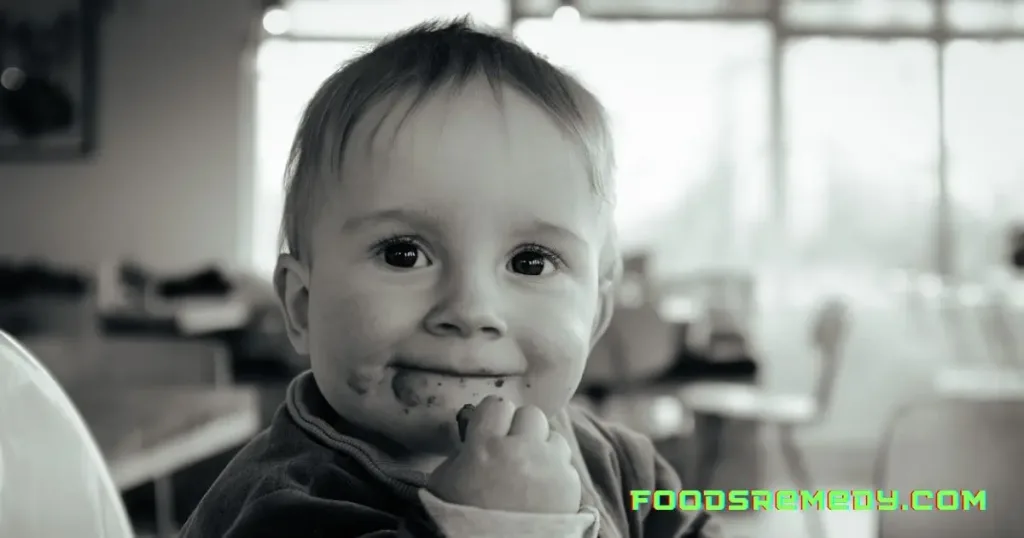The right time to feed a baby solid food is generally around six months of age. Introducing solid foods too early can increase the risk of allergies and digestive issues, while delaying the introduction of solid foods may lead to nutrient deficiencies.
It is important to watch for signs of readiness, such as sitting up with minimal support, showing interest in food, and able to control head and neck movements. When the baby is developmentally ready, it is recommended to start with single-ingredient foods, gently introducing new foods one at a time.

This gradual introduction allows for the observation of any potential allergic reactions or digestive problems. Additionally, breastfeeding or formula feeding should continue alongside the introduction of solid foods to ensure proper nutrition.
Why Introduce Solid Foods?
Why Introduce Solid Foods?
Baby Development Milestones
Babies develop key skills for eating solid foods.
Nutritional Needs
Solid foods provide essential nutrients for baby growth.
Signs Your Baby Is Ready
Babies show signs of readiness for solid food, such as sitting up unassisted and showing interest in what you’re eating. Look for cues like good head control and the ability to swallow easily before introducing solids to your little one.
Introducing solid foods to your baby is an exciting milestone, but it’s important to know when it’s the right time. Babies develop at their own pace, so it’s crucial to look out for these signs to ensure they are ready for their first taste of solid food. Understanding the physical signsbehavioral cues that indicate readiness will help you make an informed decision for your little one.
Physical Signs
1. Head and Neck Control: Your baby should be able to keep their head steady and sit up on their own, or with minimal support. This indicates that their neck and core muscles are strong enough to handle solid foods. 2. Ability to Sit Up: Sitting upright without assistance is an essential skill for safe and effective eating. Watch for your baby’s ability to maintain a stable sitting position, as this helps prevent choking hazards. 3. Loss of the Tongue-Thrust Reflex: Initially, babies have a natural instinct to push food out of their mouths with their tongues. If your baby has lost this reflex and can move food to the back of their mouth, it’s a positive sign that they are ready for solids. 4. Increased Appetite and Interest in Food: If your little one seems unsatisfied with breast milk or formula alone and shows eagerness or curiosity when they see others eating, it may be a sign that they are ready for a new culinary adventure.
Read More How to Take Care of Newborn Baby in Summer
Behavioral Cues
1. Watching Others Eat: Babies are natural imitators. If your little one carefully observes you or siblings during meal times and tries to mimic your actions, it could be an indication that they are ready for solid food. 2. Increased Chewing Movements: Pay attention to your baby’s chewing motions during breastfeeding or bottle feeding. If they start moving their jaw in a chewing motion or show increased interest in mouthing objects, it might mean they are preparing their skills for solid food. 3. Controlled Hand-to-Mouth Movements: As your baby’s hand-eye coordination improves, they will begin to explore objects with their hands and bring them to their mouths. When they can successfully bring toys or other objects to their mouths with consistency, it shows they are developing the necessary motor skills for self-feeding. Remember, every baby is unique, and these signs should be considered as a general guideline. Consult with your pediatrician for personalized advice and recommendations on when to introduce solids. Understanding your baby’s readiness for solid food ensures a positive and successful transition to this new stage of their journey towards nutritious and diverse eating habits.
Choosing The Right Time

Choosing the Right Time to feed a baby solid food is a crucial decision for parents. While it’s an exciting milestone, determining the appropriate time requires careful consideration and guidance from healthcare professionals. Here’s how you can make an informed decision for your little one.
Consulting With Pediatrician
Before introducing solid foods, it’s imperative to consult with a pediatrician. Pediatricians can provide tailored advice based on your baby’s specific growth and development. They can evaluate if your baby is physically and developmentally ready for solids, taking into account factors such as head and neck control, sitting without support, and interest in food.
Avoiding Early Introduction
Introducing solid foods too early can be detrimental to a baby’s health. Early introduction can lead to digestive issues, such as allergies and food intolerances, as well as an increased risk of obesity. Waiting until the recommended age, typically around 6 months, allows a baby’s digestive system to mature and reduces the likelihood of adverse reactions to new foods.
Preparation For Solid Food Introduction
Introducing solid food to your baby should align with their developmental milestones. Babies are typically ready for solid food around six months to meet their growing nutritional needs. Look for cues such as sitting up steadily and showing interest in food to know when to start.
Gathering Necessary Supplies
“` Preparing to introduce solid foods to your baby requires gathering some essential supplies to ensure a smooth transition. Bibs, small spoons, high chairs, and soft-tipped infant feeding spoons are must-haves. Additionally, investing in a few baby-friendly bowls and plates in non-breakable material can help make mealtime a more enjoyable experience for your little one.
Read More How to Take Care of a Newborn Baby for the First Time
Creating A Feeding Schedule
“` Establishing a feeding schedule is crucial for a successful transition to solid foods. Start by observing your baby’s hunger cues and identify the times when they are most alert and interested in trying new foods. Develop a routine where solid foods are introduced at a time when your baby is not overly hungry or tired, ensuring they are receptive to new tastes and textures. Gradually incorporating solid foods into your baby’s daily feeding routine will help them develop healthy eating habits from an early age.

Starting With Simple Foods
Introducing solid foods to your baby is an exciting milestone, but knowing when to start can be a source of confusion for many parents. As per the American Academy of Pediatrics (AAP), the general recommendation is to start introducing solid foods around 6 months of age, when your baby shows signs of readiness. However, every baby is different, and it’s important to watch for developmental cues and consult with your pediatrician before embarking on this new adventure.
Single-ingredient Foods
When you begin introducing solids to your baby, it’s best to start with single-ingredient foods. These are gentle on their delicate digestive systems and help identify any potential food allergies or sensitivities. Rice cereal, pureed sweet potatoes, applesauce, and mashed bananas are excellent choices for beginners. Remember to introduce one new food at a time, waiting for a few days to observe any adverse reactions before moving on to the next food.
Gradual Introduction Of New Flavors
As your baby becomes familiar with solid foods and their taste buds develop, it’s essential to gradually introduce new flavors to expand their palate. Introduce vegetables like carrots, peas, and squash, along with fruits such as pears, peaches, and avocados. Remember to offer a variety of single-ingredient foods to provide a balanced diet. Mixing and combining flavors can be a fun way to keep mealtime interesting and encourage healthy eating habits.
It’s crucial to remember that every baby is different, and they may show signs of readiness for solid foods at different times. Trust your parental instinct and consult with your pediatrician to determine the right time to start solids. Remember to start with simple, single-ingredient foods and gradually introduce new flavors to ensure a smooth transition to solid food. Happy feeding!
Feeding Techniques
Watching For Allergic Reactions
Watch closely for any signs of allergic reactions such as rash, swelling, or breathing difficulties.
Encouraging Self-feeding
Allow your baby to explore and interact with food to encourage self-feeding skills and develop independence.
Common Mistakes To Avoid
When beginning the journey of introducing solid foods to your baby, it’s essential to be mindful of common mistakes that many parents make. Avoiding these pitfalls will help ensure a smooth and successful transition for your little one.
Rushing The Process
Avoid introducing solid foods too early out of pressure or misconception about the right time. Babies should be at least 4-6 months old before starting solids.
Ignoring Baby’s Cues
Pay close attention to your baby’s signals for hunger and fullness. Feeding should be guided by their cues, not a set schedule.
Monitoring Baby’s Progress
Monitoring a baby’s progress is crucial when introducing solid foods. By observing their reactions, growth, and development, you can ensure they are ready for this milestone. It’s essential to keep track of allergies and assess their growth and development regularly.
Keeping Track Of Allergies
Babies can develop allergies to certain foods, so it’s important to introduce new foods one at a time and monitor their reactions. Watch for any signs of allergies such as rashes, hives, vomiting, or diarrhea. Keeping a record of the foods they’ve tried and any reactions can help identify potential allergens.
Assessing Growth And Development
As your baby starts eating solid foods, it’s essential to observe their growth and development. Monitor their weight gain, physical milestones, and motor skills development. Check with their pediatrician to ensure they are meeting their developmental milestones and gaining the right amount of weight.
Frequently Asked Questions For When Is The Right Time To Feed A Baby Solid Food
Can I Give My 4 Month Old Baby Food?
No, it’s best to stick to breast milk or formula exclusively for your 4-month-old baby.
Is It Better To Start Solids At 4 Months Or 6 Months?
Starting solids at 6 months is recommended by experts. This allows babies to develop digestive and motor skills needed to handle solid food. Introducing solids before 6 months may increase the risk of allergies and digestive problems.
What Is The Best Time Of Day To Feed Baby Solids?
The best time to feed baby solids is during breakfast or lunch to avoid potential digestion issues.
What Baby Food Should I Introduce First?
You can start with single ingredient purees like sweet potatoes, peas, or bananas. Introduce one new food at a time to check for allergies. Offer the same food for a few days before trying something new. Avoid honey and cow’s milk before 1 year.
Conclusion
Introducing solid foods to a baby’s diet is an important milestone, but it should be approached with caution and guidance. By following their developmental cues and consulting with healthcare professionals, parents can determine the right time to begin this transition.
Starting solid foods at around six months of age, when the baby can sit up, shows interest in food, and can swallow effectively, is generally recommended. Remember, every baby is unique, and it’s important to listen to their cues and adjust accordingly.

